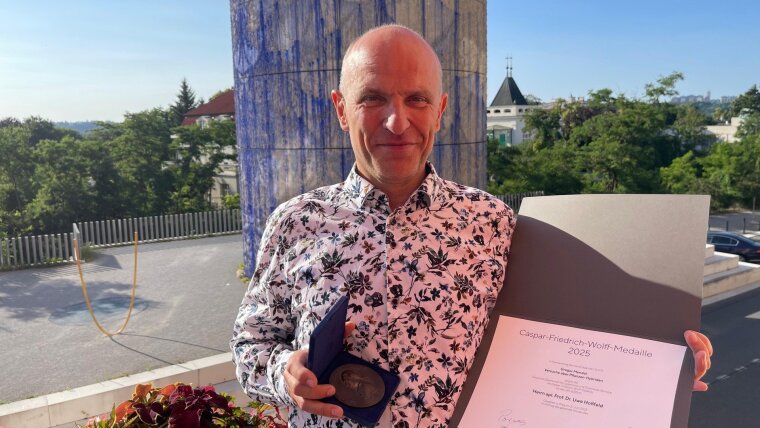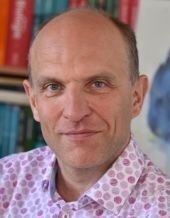
- Life
- Awards and Personnel
Published: | By: Stephan Laudien
Associate Prof. Dr Uwe Hoßfeld was awarded the Caspar Friedrich Wolff Medal of the German Society for the History and Theory of Biology (DGGTB) on 21 June. The biology education expert and historian of science from Friedrich Schiller University Jena received the award together with his colleagues Michael Mielewczik (Adlikon, Switzerland) and Michal Simunek (Czech Academy of Sciences Prague, Czech Republic). The three scientists were honoured for their more than 600-page publication "Gregor Mendel. Versuche über Pflanzen-Hybriden" ("Gregor Mendel. Experiments on Plant Hybrids"), which they have produced together over the last ten years.
The book, published by Springer in 2024, contains an extensively annotated reprint of Mendel's publications, as well as references to Mendel's life and work, the reception of his work since 1865 and the so-called rediscovery after 1900. The publication is rounded off with a well-founded presentation of the scientific and social significance of Mendel's work
The Caspar Friedrich Wolff Medal was awarded on the occasion of the 33rd anniversary of the DGGTB on the topic of "Aristocracy and Natural Science" last weekend in Prague. Hoßfeld had already received the prestigious Mendel Memorial Medal in Brno in 2022 for his services to the history and theory of genetics.
Two decades of fruitful cooperation with the Prague Academy
"The Research Group for Biology Education at the University of Jena has been cooperating with the Czech Academy of Sciences in Prague for two decades now," says Uwe Hoßfeld. During this time, there has been joint research on eugenics and racial science, plant breeding, visualisation of heredity, "euthanasia" and biology in the Nazi era, as well as work on Gregor Mendel and the topic of "genetics and schools".
In spring 1854, the Augustinian monk Mendel (1822–1884) began cross-breeding experiments with garden peas (Pisum sativum). It was these experiments on over 28,000 pea plants that secured his posthumous world fame. They formed the starting point for the establishment of a new scientific discipline—genetics. Gregor Mendel first presented the results of his work in two lectures in 1865 at the Natural History Society in Brno.
His manuscript was published in 1866. Since then, Mendel's rules have had an unpredictable influence on the development and transformation of biology, agriculture and science as such. Over the last 160 years, Mendel's experiments have repeatedly inspired and influenced new generations of scientists.
The Caspar Friedrich Wolff Medal of the German Society for the History and Theory of Biology is awarded for special services to the history of biology or an outstanding scientific work on a topic related to the history of biology. The award is not endowed. The medal named after Caspar Friedrich Wolff (1734–1794), the founder of embryology.
